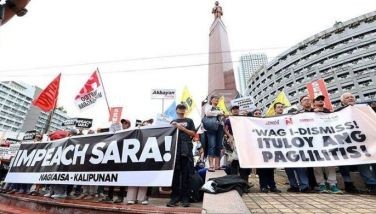So why is Taiwan banning RP cement?

March 23, 2002 | 12:00am
The leak by a congressman’s staff of a "sex dossier" on Comelec chief Alfredo Benipayo only muddled the issues in the poll body. The scandal sheet, mislabeled as official findings of the Commission on Appointments, linked Benipayo to a former sub in the Supreme Court with whom he in fact had been feuding. The woman went to television to say that she and Benipayo hardly talked to each other when he was court administrator, an episode well known by insiders. The issues remain. Benipayo refuses to implement the contract for a computerized voter registration and ID system in the belief that, because it costs P6.5 billion, it is anomalous. He has not brought charges against the winning bidder Photokina, whose consortium includes US giants Unisys, IBM and Polaroid. On the other hand, the US embassy had asked both the Comelec and Malacañang if there was any hanky-panky. Assured that the consortium had won the Oct. 2000 bidding fair and square, it urged the government to enforce a legal contract, more so since the US firms already have spent $1.4 million for initial work. Photokina also went to court "with clean hands," seeking an end to the delays. Four Comelec commissioners, with whom Benipayo has been squabbling, did not contest the contract. The judge ruled for implementation.
Benipayo is inclined to instead go only for automated counting, the last of three phases to modernize elections. Going by his contention that amounts alone show anomalies, this equally crucial phase might not see the light of day. Installing automated counters in all polling centers would cost $450 million, or P22.5 billion. Benipayo proposes to spend only a third of the amount by scrimping on counters. In selected locales, ballots will be brought to the municipio for counting. Even without the danger of ballot box snatching that usually mars elections, it would still hit P7.5 billion, clearly higher than computerized registration.
But the expensive fact is that government must spend both the P6.5 billion to clean up the voter list, plus P22.5 billion (not just a scrimpy P7.5 billion) to automate ballot counting. More so with absentee voting, which will require new listing of five million overseas workers whose votes will be counted at their host-countries. Needed, too, is P200 million to complete the precinct mapping. Lack of funds cannot be used as an excuse to stall clean elections from which democratic government springs.
It’s final. The Tariff Commission has scrapped the P20.60 tax that Trade Sec. Mar Roxas earlier tacked on each bag of cement dumped from Taiwan. That supposedly will perk up the construction industry, although no such thing happened when four Taiwanese importers flooded Manila with cheap cement for close to two years and almost killed local makers.
The three-man Commission said the importers account for only 21 percent of the supply, so what’s the beef? Well, in a season of low demand, the 17 local makers can hardly make ends meet. A 21 percent-slice by four Taiwanese dumpers alone in fact almost shut down two of the 17.
The cement case was the first to be brought to the Commission under RA 8800. Passed in 1996, the Safeguards Measures Act gives temporary relief to sectors whose industrial or agricultural goods are crushed by RP’s rush to ride the global merry-go-round. It was copied from the same US law that allowed President Bush this month to slap a 30-percent tariff on steel imports, to save US firms and jobs. The World Trade Organization allows safety nets. In fact, it encouraged the passage of RA 8800 after RP joined the WTO in 1994 without the safeguards. Such safeguards include temporary tariffs, such as the P20.60 per bag that Roxas stuck for 200 days starting mid-Nov.
The Commission’s decision on the cement case naturally will set precedents. And how interesting these will be.
For one, it said that the cement makers failed to provide documents to prove business injury caused by the Taiwanese dumping. The makers naturally didn’t hold the papers, such as import letters of credit. With its powers, the Commission could have required the four Taiwanese dumpers to produce such papers. One wonders now how onion farmers, suffering from Chinese dumping, will fare if they complain to the Commission. The Customs bureau does not have figures on the exact volume of onions that several ships dumped into Manila from Jan.-Mar., at a time when Luzon farmers were harvesting. The Chinese dumpers possess such papers. But going by precedent, the onion farmers would have to beg, steal or borrow the papers from their very tormentors.
The Commission also ruled that absolute free trade is in the national interest. Strange, for the Commission exists for the very safeguards set by RA 8800. It would seem that this means RP should do away with safety nets. But it can’t. Safety nets are precisely for countries and industries that are not ready for full scrapping of import tariffs that the WTO envisions. Private firms, by their very nature, can easily adapt to unfettered free trade by seeking efficiencies, that is, cutting wasteful expenses and concentrating on quality improvements. But private firms don’t exist in a vacuum. They have inept or corrupt bureaucracies to deal with–maladies that push up their costs of operation. Didn’t expats complain long ago about RP’s bureaucratic red tape? In the absence of solutions from government, a good number of them packed up for Singapore. Aren’t legislators like Senate President Pro Tempore Manuel Villar and Rep. Aurelio Umali realizing only now that government must set up an Onion Research Institute to help allium farmers in R&D? This, because the Bureau of Plant Industry and Customs can’t curb the recycling of one-time import permits.
Most interesting is how the Commission will react when Taiwan makes final its temporary ban on RP cement imports. Taiwan closed its doors by filing an antidumping suit against all Philippine cement makers, although only two exported to it early last year. It acted swiftly on the complaint of Taiwan Cement Corp., one of the four dumpers who also want RP to open its doors. TCC cried that RP cement ate four percent of the Taiwanese market, compared to the 21 percent that it gobbled in RP. It wants a 65-percent tariff of RP cement for five years, compared to the 16.5-percent temporary tariff that Roxas slapped for only 200 days, and which the Commission scrapped after less than 120 days.
Did they not learn from the mistake at SSS? GSIS employees walked out of their jobs recently because the new management refused to give any more doles to the union. It’s akin to last year’s labor strike at SSS when the management investigated six long-time execs, who are chummy with the union, for stock-market deals from which 23 million members lost billions of pesos. The strife led to the suspension of the execs and filing of charges of illegal strike against the employees, who had to hire their own lawyers since the union wouldn’t help.
It one thing for a union to care for the workers’ benefits. It’s another for it to block reforms that benefits SSS and GSIS members and pensioners.
At the Department of Education, about 700 employees are picketing Sec. Raul Roco for stopping their collection of service fees from 150,000 fellow-employees. The fees were for the supposed extra work of the 700 of deducting monthly payments of loans that teachers and nonacademic personnel took out from private firms.
It would’ve been outright illegal for the private firms to pay the 700 employees for the work. But for the government to do it is also immoral.
The bad news is that the foreign office has run out of passports. The good news is that more jobs will be opened in Canada for Filipinos.
Labor Attache Romeo Young is working with Canadian authorities to take in more Filipino seamen, information technologists, caregivers and registered nurses.
Catch Sapol ni Jarius Bondoc, Saturdays, 8-10 a.m., on DWIZ 882-AM.
You can e-mail comments to Jariusbondoc@workmail.com.
Benipayo is inclined to instead go only for automated counting, the last of three phases to modernize elections. Going by his contention that amounts alone show anomalies, this equally crucial phase might not see the light of day. Installing automated counters in all polling centers would cost $450 million, or P22.5 billion. Benipayo proposes to spend only a third of the amount by scrimping on counters. In selected locales, ballots will be brought to the municipio for counting. Even without the danger of ballot box snatching that usually mars elections, it would still hit P7.5 billion, clearly higher than computerized registration.
But the expensive fact is that government must spend both the P6.5 billion to clean up the voter list, plus P22.5 billion (not just a scrimpy P7.5 billion) to automate ballot counting. More so with absentee voting, which will require new listing of five million overseas workers whose votes will be counted at their host-countries. Needed, too, is P200 million to complete the precinct mapping. Lack of funds cannot be used as an excuse to stall clean elections from which democratic government springs.
The three-man Commission said the importers account for only 21 percent of the supply, so what’s the beef? Well, in a season of low demand, the 17 local makers can hardly make ends meet. A 21 percent-slice by four Taiwanese dumpers alone in fact almost shut down two of the 17.
The cement case was the first to be brought to the Commission under RA 8800. Passed in 1996, the Safeguards Measures Act gives temporary relief to sectors whose industrial or agricultural goods are crushed by RP’s rush to ride the global merry-go-round. It was copied from the same US law that allowed President Bush this month to slap a 30-percent tariff on steel imports, to save US firms and jobs. The World Trade Organization allows safety nets. In fact, it encouraged the passage of RA 8800 after RP joined the WTO in 1994 without the safeguards. Such safeguards include temporary tariffs, such as the P20.60 per bag that Roxas stuck for 200 days starting mid-Nov.
The Commission’s decision on the cement case naturally will set precedents. And how interesting these will be.
For one, it said that the cement makers failed to provide documents to prove business injury caused by the Taiwanese dumping. The makers naturally didn’t hold the papers, such as import letters of credit. With its powers, the Commission could have required the four Taiwanese dumpers to produce such papers. One wonders now how onion farmers, suffering from Chinese dumping, will fare if they complain to the Commission. The Customs bureau does not have figures on the exact volume of onions that several ships dumped into Manila from Jan.-Mar., at a time when Luzon farmers were harvesting. The Chinese dumpers possess such papers. But going by precedent, the onion farmers would have to beg, steal or borrow the papers from their very tormentors.
The Commission also ruled that absolute free trade is in the national interest. Strange, for the Commission exists for the very safeguards set by RA 8800. It would seem that this means RP should do away with safety nets. But it can’t. Safety nets are precisely for countries and industries that are not ready for full scrapping of import tariffs that the WTO envisions. Private firms, by their very nature, can easily adapt to unfettered free trade by seeking efficiencies, that is, cutting wasteful expenses and concentrating on quality improvements. But private firms don’t exist in a vacuum. They have inept or corrupt bureaucracies to deal with–maladies that push up their costs of operation. Didn’t expats complain long ago about RP’s bureaucratic red tape? In the absence of solutions from government, a good number of them packed up for Singapore. Aren’t legislators like Senate President Pro Tempore Manuel Villar and Rep. Aurelio Umali realizing only now that government must set up an Onion Research Institute to help allium farmers in R&D? This, because the Bureau of Plant Industry and Customs can’t curb the recycling of one-time import permits.
Most interesting is how the Commission will react when Taiwan makes final its temporary ban on RP cement imports. Taiwan closed its doors by filing an antidumping suit against all Philippine cement makers, although only two exported to it early last year. It acted swiftly on the complaint of Taiwan Cement Corp., one of the four dumpers who also want RP to open its doors. TCC cried that RP cement ate four percent of the Taiwanese market, compared to the 21 percent that it gobbled in RP. It wants a 65-percent tariff of RP cement for five years, compared to the 16.5-percent temporary tariff that Roxas slapped for only 200 days, and which the Commission scrapped after less than 120 days.
It one thing for a union to care for the workers’ benefits. It’s another for it to block reforms that benefits SSS and GSIS members and pensioners.
At the Department of Education, about 700 employees are picketing Sec. Raul Roco for stopping their collection of service fees from 150,000 fellow-employees. The fees were for the supposed extra work of the 700 of deducting monthly payments of loans that teachers and nonacademic personnel took out from private firms.
It would’ve been outright illegal for the private firms to pay the 700 employees for the work. But for the government to do it is also immoral.
Labor Attache Romeo Young is working with Canadian authorities to take in more Filipino seamen, information technologists, caregivers and registered nurses.
BrandSpace Articles
<
>
- Latest
- Trending
Trending
Latest
Recommended
























